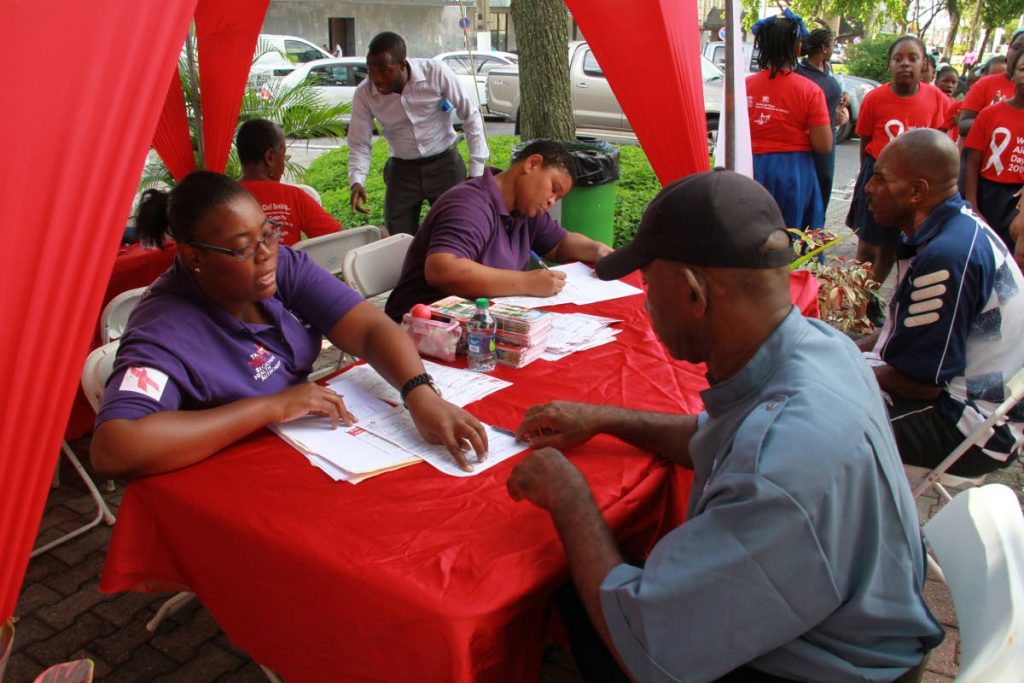NACC: Give firms tax breaks to support HIV/AIDS programmes

BUSINESSES should be afforded tax credit incentives to fund programmes to eradicate the HIV and AIDS epidemics, as Caricom intends to do by 2030.
Dr Ayanna Sebro, technical director of the National AIDS Co-ordinating Committee of Trinidad and Tobago (NACC), made this and several other suggestions at a Pan Caribbean Partnership Against HIV/AIDS (Pancap) workshop on financing HIV and AIDS programmes in the region.
The two-day workshop at the Courtyard by Marriott, Port of Spain ended on July 8.
“As we continue our local and regional progress towards ending AIDS by 2030, there is a need to scale up our respective responses to HIV and AIDS by funding interventions to close the gaps,” she said.
Over 300,000 people (approximately 1.2 per cent of the regional population) were living with HIV and AIDS in the Caribbean in 2022, according to UNAIDS, a UN agency. About 16,000 were new cases – a 15 per cent decline from 2021.
UNAIDS regional adviser (community support) Guillermo Marquez highlighted a significant 52 per cent deduction in AIDS-related deaths in the region.
"That's also a big achievement because it shows that people are accessing treatment and we're improving on service provision," Marquez said.
He said about 83 per cent of people living with HIV are aware of their status, andof these, 68 per cent access treatment.
"Those numbers need to be improved, but I think they're good, and over the years we have seen (these figures) improve."
UNAIDS is due to release its 2022 data at the end of July.
Sebro, speaking on behalf of line minister Ayanna Webster-Roy, suggested consideration be given to establishing a tax credit incentive “to encourage the corporate sector to make a more positive impact in providing much-needed financial resources.
“The State should also be encouraged to increase funding to CSOs (civil society organisations) while simultaneously formalising the social contracting between the State and CSOs.”
She said in Trinidad and Tobago the government and the NACC engage in social contracting mechanisms, “where CSOs, which include and serve key populations, receive domestic funding to deliver key services to target populations.
Sebro acknowledged that Caribbean countries whose tourism-based economies have been adversely affected by covid19, inflation, climate change and other global geopolitical instability, may face greater challenges.
“Hence there is need to for us to come together to brainstorm possible strategies for ensuring the sustainability of effective prevention, treatment, and support services.”
The sustainability of HIV programmes, she said, depends largely on the availability of financial resources, and we all know that international funding has been reduced.
“New sources of funding are required to ensure the existing programmes are sustainable and even more importantly, that they reach more people.
“The mobilisation of resources from our respective domestic sectors and international partners would therefore redound to enhance the delivery of HIV services for all vulnerable persons.”
She said having adequate finance is a “key question which countries must probe,” adding that sustainable financing must not leave a burden for implementing agencies to address.
Sebro also noted that representation by CSOs for subventions is "typically underfunded or not funded at all.
“This remains a major concern which must be addressed. While funds may be available, the inability of CSOs to satisfy the eligibility requirement remains an issue.
“Likewise, the inability of CSOs to prepare proper and timely proposals for donor organisation consideration remains a major shortcoming.”
Sebro said that, together with tax incentives, special funds are established by the state lottery boards in some countries to assist the needs of the vulnerable, and suggested the same should be established in Trinidad and Tobago.
“The corporate sector should be encouraged to assist a greater number of CSOs to ensure…more accessibility to the resources for our people.”
Marquez highlighted data to show the epidemic's main drivers.
"We know that social and structural barriers are key, key elements...posing a driving force into the epidemic.
"Stigma and discrimination, legal environments, punitive laws, gender inequality, gender violence; we all know that those are impacting the drive of the epidemics.
"We also have data showing that if we do not act on those social and structural barriers, then we will not be reaching targets of 2030."
Stakeholders, including policymakers, held panel discussions and networking sessions to mobilise financing for HIV/AIDS prevention, treatment and education programmes, and best practices in achieving those objectives.
Trinidad and Tobago, Suriname, Jamaica, Guyana, Belize, Antigua and Barbuda, and Barbados are the workshop's intended beneficiaries.

Comments
"NACC: Give firms tax breaks to support HIV/AIDS programmes"